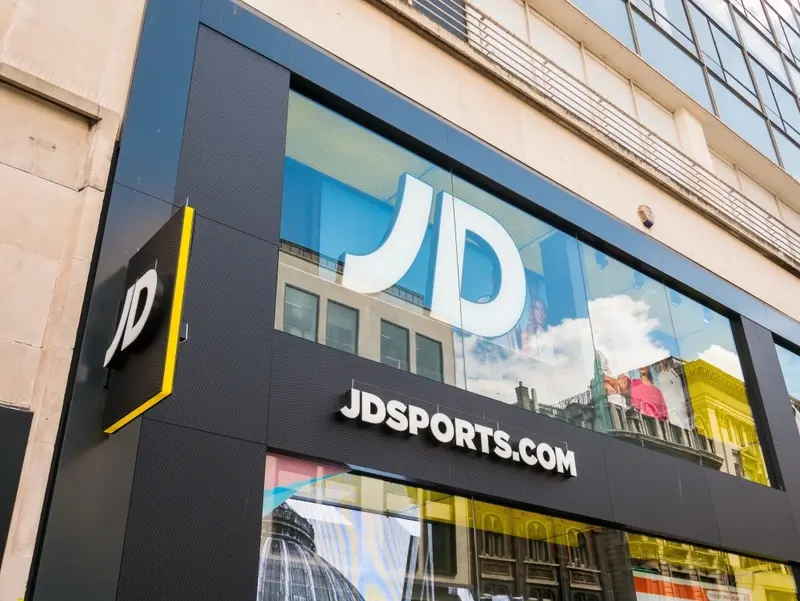
- ‘King of Trainers’ delivers resilient first half performance
- US business returned to growth
- Retailer remains cautious about rest of second half
Trainers-to-tracksuits retailer JD Sports Fashion (JD.) faced down increasingly tough market conditions to deliver first half results at the top end of management’s expectations.
However, the shares cheapened 4% to 118.85p after the athleisure leader issued a cautious second half outlook and stuck with earnings guidance for the year to January 2023, with management concerned about the impact of macro-economic uncertainty, inflation and the potential for further supply chain disruption ‘with industrial action a continuing risk in many markets’.
Despite the cost-of-living crisis and a supply shortage from certain international brands, the sports fashion retailer and self-styled ‘King of Trainers’ delivered a 14% rise in revenues to £4.4 billion for the first half to 30 July 2022.
Adjusted pre-tax profit declined by 13% to £384 million against demanding prior year comparatives, but the result was in line with consensus and at the top end of the board’s expectations.
RESILIENT TRADING CONTINUES
JD Sports generated robust organic growth in its retail businesses of 5% in the half and said this level of growth has continued in the second half to date, including a return to growth in the US, a key long-term growth market for the group.
Chairman Andrew Higginson said ‘we continue to be reassured by the ongoing resilience in the group’s performance with trade to date through the second half following a similar trend to the first half with total sales in the group’s organic retail businesses tracking around 8% ahead of the prior year after six weeks.’
Yet given the cost-of-living squeeze, inflationary pressures and supply chain risks, JD Sports remains ‘cautious about trading through the remainder of the second half’ and accordingly, is sticking with its guidance that profits for the year to January 2023 will be in line with last year’s record performance.
JD Sports, which has drawn a line under the acrimonious departure of its former boss Peter Cowgill by agreeing terms on a £5.5 million pay package, said new CEO Regis Schultz has now commenced in the role and Higginson insisted Schultz has ‘the right characteristics and experience to lead the group on the next phase of its journey.’
EXPERT VIEWS
Forecasting flat adjusted pre-tax profits of £947 million for the year to next January, Shore Capital commented: ‘In our view, a marked decline in the share price over the past year is unwarranted, with a perceived increase in risk due to the cost-of-living squeeze. We see the company as one of the strongest plays within the retail sector and see recent share price weakness as an opportunity.’
The broker continued: ‘We view the consistency in delivering against market expectations and its profit focus as desirable characteristics, supporting our positive stance on the company.’
AJ Bell investment director, Russ Mould, said: ‘Life could get a lot tougher for JD Sports given the significant headwinds facing retailers. With interest rates set to keep going up for the foreseeable future and consumers starting to feel less confident about job security given the dark clouds over the economy, JD is going to need some highly desirable products on its shelves or its second half results won’t be a patch on the first half.
‘A reduction in consumer spending combined with the potential for more supply chain disruptions could add up to a nasty cocktail, and one that could give Regis Schultz serious challenges in his first months as the new chief executive.’
Mould added that JD appears to be keeping its eye on the longer-term opportunity rather than retrenching because of the near-term headwinds. ‘It is investing in stores to make them look smarter, thereby strengthening its appeal to shoppers who want to own the latest must-have trainers and be seen to shop in the best-looking places.
‘This should serve the company well in the long term as many of its rivals are likely to be fretting about the current conditions and risk losing market share if they get scared. But JD still needs to be prepared for a tough period in the coming months and continue to keep an eye on the money coming in and going out.’
DISCLAIMER: Financial services company AJ Bell referenced in this article owns Shares magazine. The author of this article (James Crux) owns shares in AJ Bell.






